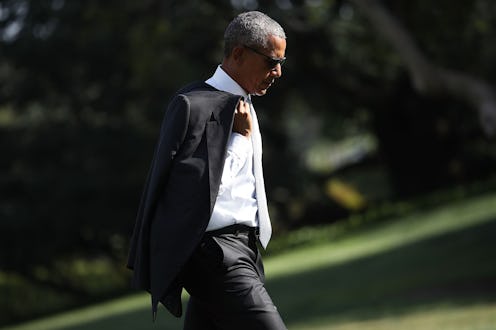News
POTUS Breaks Record With Recent Commutations
On Tuesday, President Barack Obama's administration commuted the sentences of 111 federal prisoners, adding to the 214 commutations that it made earlier in August. That brings the total for one month above the number that any president has made in a full year over the past century, NBC News reported. Throughout his presidency, Obama has granted 670 commutations, more than the number granted by the past ten presidents together. Why is Obama granting so many commutations?
The answer involves the impact of the "War on Drugs" on mass incarceration. According to a White House statement on the recent commutations, these prisoners, including 35 who had life sentences, are "individuals who received unduly harsh sentences under outdated laws for committing largely nonviolent drug crimes." NBC News reported that some of the charges behind the commuted sentences include distribution or possession of drugs like methamphetamine and cocaine.
The reduction of these prison sentences is certainly good news for the 670 individuals who will serve less time. Taking the long view, however, relying on presidential commutations is not a winning plan for effectively dealing with mass incarceration. As the The Washington Post noted, only 14 percent of the prison population in the United States is in federal prison, and the president doesn't have the ability to commute sentences at the state level in most states. About half of the federal prison population is composed of drug offenders, while, at the state level, about 17 percent of inmates have been incarcerated due to nonviolent drug offenses.
But Obama's record-breaking commutation spree in his final year in office is reflective of the growing conversation in the country about the problem of mass incarceration and questions about the legitimacy of locking people up for drug use or sales when no violent crimes were involved. It could signal a strengthened push for nixing mandatory minimum sentencing, so judges can have more sentencing discretion over individual cases, and it may even have bipartisan support. The Democratic party's 2016 platform includes a promise to "reform" mandatory minimum sentencing laws, and the Republican party's platform states that "modifications" to the laws should target nonviolent offenders and people with substance abuse and/or mental health issues.
There are plenty more federal prisoners whose sentences Obama could commute; he's commuted less than one percent of the federal prison population. But in order to effectively address the issues of mass incarceration and nonviolent prison sentencing in the United States, laws need to change. As for the 17 percent in state prisons on nonviolent drug charges? I believe it's on governors to take Obama's lead.
